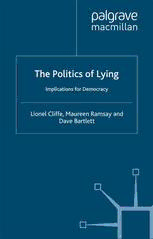
The Politics of Lying: Implications for Democracy PDF
Preview The Politics of Lying: Implications for Democracy
The Politics of Lying This page intentionally left blank The Politics of Lying Implications for Democracy Lionel Cliffe Professor of Politics Department of Politics University of Leeds Maureen Ramsay Senior Lecturer in Political Theory Department of Politics University of Leeds and Dave Bartlett Department of Politics University of Leeds First published in Great Britain 2000 by MACMILLAN PRESS LTD Houndmills, Basingstoke, Hampshire RG21 6XS and London Companies and representatives throughout the world Acatalogue record for this book is available from the British Library. ISBN 978-1-349-40375-2 ISBN 978-0-230-59784-6 (eBook) DOI 10.1057/9780230597846 First published in the United States of America 2000 by ST. MARTIN’S PRESS, INC., Scholarly and Reference Division, 175 Fifth Avenue, New York, N.Y. 10010 Library of Congress Cataloging-in-Publication Data Cliffe, Lionel The politics of lying : implications for democracy / Lionel Cliffe and Maureen Ramsay; with case studies by Dave Bartlett p. cm. Includes bibliographical references and index. 1. Official secrets—United States. 2. Official secrets—Great Britain. 3. Official secrets—United States—Case studies. 4. Official Secrets—Great Britain—Case studies. 5. Deception—Political aspects—United States. 6. Deception—Political aspects—Great Britain. I. Ramsay, Maureen, 1948– II. Bartlett, Dave, 1947– III. Title JK468.S4 C58 2000 320.1'01—dc21 99–053561 Selection, editorial matter, Introduction and Conclusion ©Lionel Cliffe and Maureen Ramsay 2000 Chapters 1, 2, 3 and 10 ©Maureen Ramsay 2000 Chapters 4, 5, 6 and 7 ©Lionel Cliffe 2000 Chapters 8, 9 and 11 ©Dave Bartlett 2000 Softcover reprint of the hardcover 1st edition 2000 978-0-333-71738-7 All rights reserved. No reproduction, copy or transmission of this publication may be made without written permission. No paragraph of this publication may be reproduced, copied or transmitted save with written permission or in accordance with the provisions of the Copyright, Designs and Patents Act 1988, or under the terms of any licence permitting limited copying issued by the Copyright Licensing Agency, 90 Tottenham Court Road, London W1P0LP. Any person who does any unauthorised act in relation to this publication may be liable to criminal prosecution and civil claims for damages. The authors have asserted their rights to be identified as the authors of this work in accordance with the Copyright, Designs and Patents Act 1988. This book is printed on paper suitable for recycling and made from fully managed and sustained forest sources. 10 9 8 7 6 5 4 3 2 1 09 08 07 06 05 04 03 02 01 00 For Maxine, who always faced the truth This page intentionally left blank Contents Preface and an Introduction ix Part I Justifying and Explaining Political Deception in a Democracy 11 Justifications for Lying in Politics 3 Maureen Ramsay 12 Democratic Dirty Hands 27 Maureen Ramsay 13 Explanations: The Political Context 43 Maureen Ramsay 14 Explanations: Deception in the US Political System 56 Lionel Cliffe 15 Explanations: Secrecy and Deception in the UK Political Context 80 Lionel Cliffe Part II Case-Studies 16 The Iran–Contra Affairs 95 Lionel Cliffe 17 The ‘War’ on Drugs 109 Lionel Cliffe 18 The Scott Inquiry: Matrix Churchill and the Arms to Iraq Affair 130 Dave Bartlett 19 The Pergau Dam Affair: Civil Aid and Arms Exports 153 Dave Bartlett 10 Shoot to kill 166 Maureen Ramsay 11 BSE: Mad Cows and Deregulation 188 Dave Bartlett vii viii Contents Conclusions 207 Maureen Ramsay and Lionel Cliffe Bibliography 217 Index 227 Preface and an Introduction This book had its genesis in a course with a similar title taught by Lionel Cliffe at the Department of Politics, University of Leeds. Its orig- inal aim was to follow a workshop approach which would encourage students to do their own investigations into a few of the more notori- ous cases of government dissembling or deception in recent years. But its popularity forced a widening of the net to excavate more cases for students to work on. That exploration in turn gave rise to a research project which involved a deepening as well as a widening of the inves- tigations, as a whole hidden side of political life in English-speaking countries was increasingly laid bare. Growing awareness of the subma- rine parts of this iceberg prompted analytical questions of how such incidents were to be explained. Much of this volume is given over to an analysis of some of these notorious cases on both sides of the Atlantic. Each case-study covers familiar ground in the course of attempting to ‘nail’ the lie by comparing initial official announcements with what is later revealed. But the significance of each case for our understanding of politics and the kinds of calculations that are made by governmental actors that might ‘explain’ the deception are also probed. The more cases that are brought out, the more one realises that what also has to be explained is the seeming pervasiveness of the phenom- ena. If they were merely occasional if spectacular exceptions to normal democratic and open practices, then the ‘exceptional’ circumstances surrounding a particular case would be central to any explanation – although, even in that light, comparative analysis might allow isola- tion of the types of circumstances which are likely to give rise to gov- ernment lying. However, as more cases come to light, the possibility that they are the common stuff of ‘democratic’ politics, at least in some countries, in turn poses the need for a different level of explana- tion. Are such practices of deception systemic? And to the extent they are, is that to be understood in terms of the character of certain politi- cal leaders that give a regime its character or of politicians and power- holders generally, or of more structural characteristics or contexts of particular political systems? Or is the phenomenon to be explained as a more fundamental element in the conduct of politics in contemporary democratic polities? ix
